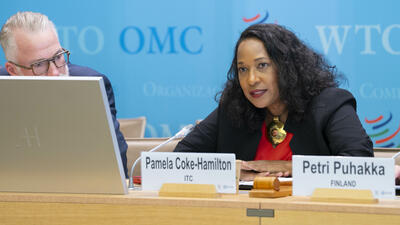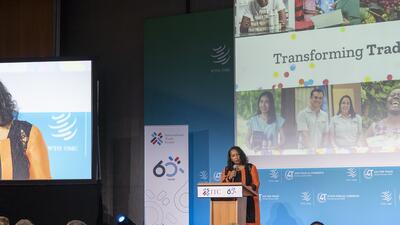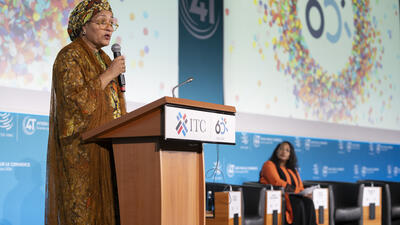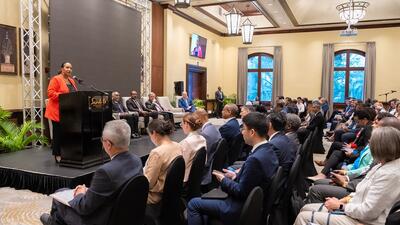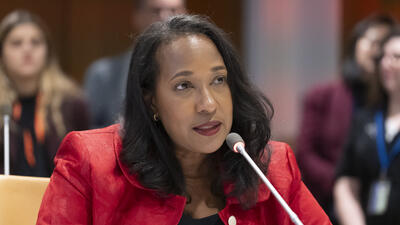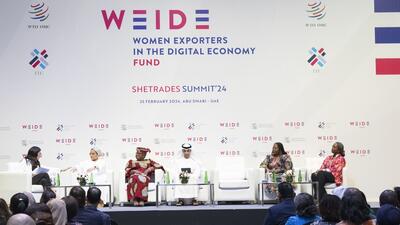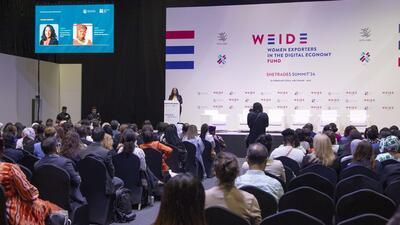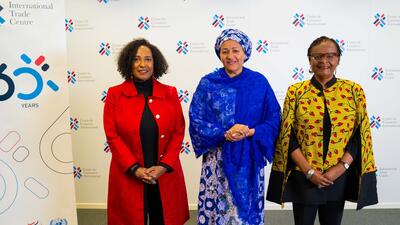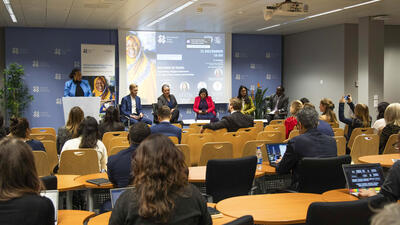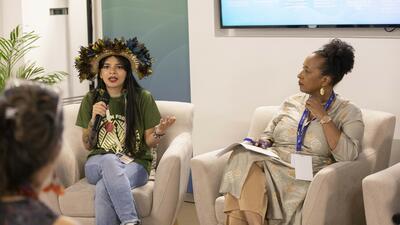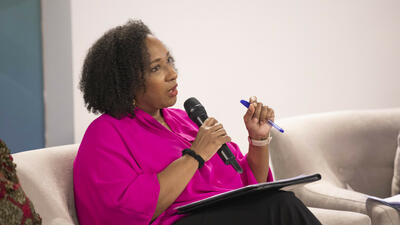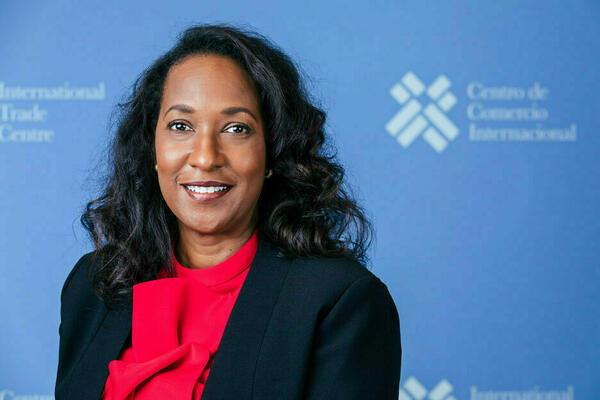
ITC Executive Director remarks at the BMZ Economic Policy Forum, Berlin
Good evening and thank you, Minister, to you and your team for inviting me to deliver this keynote. I really wish I could have been there in person – I have lifelong memories of the city where you are gathered tonight.
More than three decades ago, I was sent on Training Program for young diplomats with the DSE from July to December 1989, right in Berlin. Toward the end of the training course, on that fateful night in early November, we heard the news about the opening of the Wall. Me and the many other developing country diplomats rushed out to the Brandenburg Gate. We sat on the Wall, drank champagne and celebrated.
I’ll never forget that moment. In the multilateral world, we sometimes talk loosely about so-called revolutions and critical junctures. I remember well what those words really mean.
That’s why I’m really happy to be speaking to you tonight about the Just Transition. Another word that, in my view, gets used sometimes a little too casually. Another critical moment in history. One where the multilateral machinery – including members like Germany and organizations like ITC – need to make a massive step up if we’re going to avert a disaster, if we’re really going to make this low-carbon transition into a reality.
When we talk about big concepts like the Just Transition, or the role of a system as massive as the UN, I think it’s worth being transparent about where we come from. None of us come to an issue this consequential without some history, some baggage, some perspective.
And when my friend Rainer Engels – who did so much great work to promote regional integration on behalf of the German Government during my Caribbean days – when he asked his first question about whether multilaterals promote a Just Transition, my immediate answer was: it depends where you’re starting from.
For me, I start at home. I come from Jamaica. When you grown up in a Small Island Developing State, you are very sensitive to your climate vulnerability. We could feel the looming catastrophe long before the summers in Europe became unbearably hot.
In my own region, hurricanes are getting wilder, deadlier and costlier. In the Caribbean alone, the damage caused by climate-related disasters is estimated at $12.6 billion dollars per year— a staggering number, particularly for small countries that are already dealing with shocks from COVID, conflicts and cost-of-living increases.
For small islands, least developed and other developing countries, keeping 1.5 alive isn’t just a slogan. It’s an existential cry for help. Climate change means entire export sectors wiped out in a single hurricane, drought or flood. New environmental measures in markets like the EU mean doors slamming shut for exporters from developing countries.
So for me, the first thing a Just Transition has to address is the economic dimension that speaks across the spectrum of size, income and vulnerability. For many countries still low down on the economic ladder, the green transition sounds suspiciously like an excuse for protectionism or to kick the ladder away. If you want to speak to the vast majority of developing countries about a Just Transition, your pitch has to be grounded in the language of market opportunities, of jobs, of industrialization and of growth. Otherwise, few will listen.
I also come to this issue as a former multilateral negotiator. Not long after my moment on the Berlin Wall, I represented my country here in Geneva during the last years of the GATT, before it became the WTO. I saw first-hand what the multilateral machinery was able to accomplish – these ambitious new agreements, the reduction in tariffs, the disciplines on harmful subsidies.
But I also saw the downsides as well. I saw how the multilateral trading system tried – and failed – to really tackle environmental and sustainability issues; they became fodder for legal disputes but no real action to control the sorts of measures that could help heal the planet.
I also saw how small countries and small missions became small voices in multilateral negotiations. How the agenda of larger countries dominated the debate and how often my African, Caribbean, Pacific and LDC colleagues often struggled to keep up – it was often just one technical person and an Ambassador to cover the entire WTO.
So for me, the second area a Just Transition has to address is the issue of who is heard during these multilateral negotiations and who is not. Any transition is a negotiated process and if we don’t support small countries then we’re not having a real conversation. At least not an inclusive one.
We multilateral organizations love to organize forums, conferences and negotiations – what we call the “convening power” of multilateralism. But unless there is capacity-building every step of the way for the governments and private sector bodies that have to speak on behalf of their people, you lose those that will suffer the most if action is not taken.
The third pair of glasses I bring is as the head of an organization that speaks for small businesses in developing countries – what I call the “silent majority”. Small businesses make up 90% of businesses and contribute to 80% of emissions across the value chain.
A whole-economy transition needs small businesses on board, especially those in developing countries. Small firms in developing countries know they have to make a change, but they can’t. Nearly 70% of small firms in Sub-Saharan Africa say environmental risks are significant for their business. However less than 40% can do something about it. There’s a perception and action gap that needs to be filled and filled quickly.
So that’s the third area where I feel the multilateral discussion on the Just Transition can sometimes fall short. It’s not grounded in the private sector, especially the millions of micro, small and medium-sized enterprises in every country that is really the bedrock of inclusion. If we want to bring them on board, then we need to make a clear, open-and-shut business case for the green transition. Not just a moral case. Not just a political case. A business cases.
That brings me to Rainer’s second question. Can we – the representatives of the multilateral world – do better? I can answer without hesitation: absolutely, yes we can do better. I don’t want to be unfair. We’ve had some really important wins recently. But they could have been so much more.
We had MC12 in June, finishing in the early hours with the deal on fisheries subsidies. As someone who saw environmental issues struggle to get on the Geneva trade agenda, I see this as a first step forward for sustainability issues at the WTO. It was a hard-fought and well-deserved win for the DG and the membership. But there is still so much to do to make the disciplines binding. So much rests on the actual implementation of the agreement, and here a WTO agreement can only go so far.
I just came back from COP27. It was crazy, it was exciting, it was packed. When I was in Glasgow last year, there was barely any mention of small businesses and their role in the transition. That is why we made it our mission to bring their voice to Sharm-el-Sheikh.
At COP, my fellow Caribbean national Simon Steill and the membership, driven by Small Island States, agreed to a historic a “loss and damage” fund. But question marks remain on the financing of this new fund – whether promises made in Egypt will be honoured. And, very sadly and ominously, the membership failed to deliver on emission reductions. We are still, in the UNSG’s phrase, on a highway to climate hell.
And while we very easily talk about millions, billions and even trillions for financing, these massive pots of money will not get us to the promised land. They, alone, will not deliver the Just Transition that we are looking for.
This is simply because it is one thing to promise money and another to spend it sensibly. I am speaking to a donor agency so I can imagine that there are nodding heads on the other side of the screen.
Of course, on the grand scale, financing needs to come through – as grants or investments, not loans. Developed countries need to fulfil their $100 billion yearly commitment, and I want to recognize Germany for having been a leader, in the middle of a very difficult funding climate for all donors.
But most importantly – again, this is about engaging the silent majority; about making the business case at the SME level – financing needs to reach the base of the pyramid. There are billions sitting in banks and development finance institutions but SMEs can’t get financing.
They need help to overcome collateral requirements. They need help with documentation. They need help with not just better marketing but new markets. They need short-term, low-risk financing that more than three quarters of SME financing needs.
So that answer’s Rainer’s third question – how is ITC walking the talk on the Just Transition.
I won’t bore you with institutional advertising, but in short, we work with SMEs to ensure they can manage climate risk and harness climate opportunities.
ITC teams provide analytical tools on climate change risks and opportunities, providing stakeholders with the evidence they need to make business decisions.
We build SME capacity to respond to climate-related risks and harness new market opportunities. Our Alliances for Action project, for instance, works with farmer unions to diversify crops and income streams through sustainable farming practices.
To achieve scale – beyond what we could do with individual firms – we build the capacity of business support organizations around the world, so that they in turn can help their millions of SME clients to go green.
We represent the voices of MSMEs in the international arena, through multilateral forums, publications and events. For example, our flagship publication called the SME Competitiveness Outlook or SMECO, focused last year on a 20-point Green Recovery Plan for small businesses rebuilding from the Covid-19 pandemic.
I know that Rainer wanted me to conclude on policy but I’ll leave that for our follow-up discussion. Let me instead close by taking a story from one of our hundreds of projects. In Pakistan, we have one of our largest projects called GRASP, funded by the European Union. We work with SMEs in the agribusiness sector to become more competitive, inclusive, and climate resilient. We saw the awful images of the floods in Pakistan this summer which left one-third under water and wiped-out lives and critical infrastructure.
We pivoted our programme and offered expedited grants to our beneficiaries. It allowed several of our beneficiaries to salvage a good share of their product and still bring it to market. As one of them said, “My only concern is to continue my business. Getting the ITC grant at this stage is a godsend”.
When I was in Sharm el Sheikh, I told this story to Sherry Rehman, Pakistan’s Climate Change Minister. She was instrumental at COP, spurred on by her country’s devastating experience with climate change. After the Conference, Minister Rehman gave a copy of her book called “Womansplaining”, which brings out powerful stories of struggles, activism and justice experienced by women in Pakistan.
The book spoke to so many things I’ve touched on today. How to give meaning to big struggles and big terms like a Just Transition. How voices – heard and unheard – shape multilateral outcomes and what we can do to elevate the most vulnerable. How negotiations need to be shaped by economics, politics, activism and a clear-eyed business case for change. How, so often, money is important but not enough.
Thank you.




